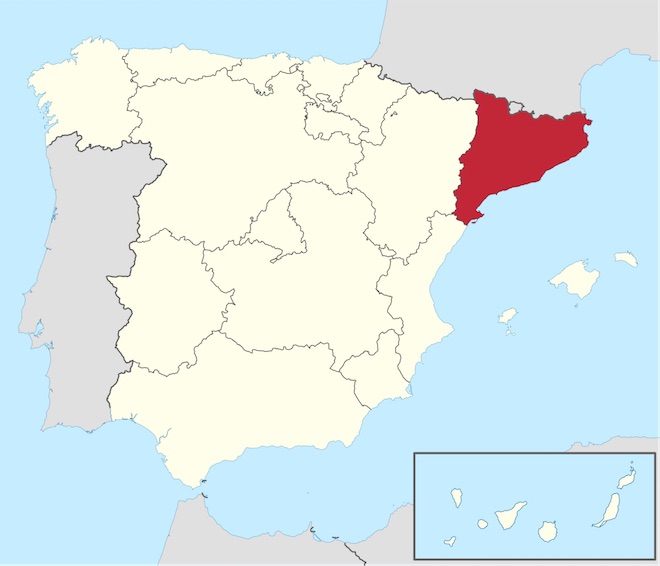The autonomous community of Catalonia in northeast Spain initiated an illegal referendum on independence on Sunday. Images of the Catalan people engaged in peaceful and violent confrontations with the national police-- who sought to prevent the vote-- shocked Spain and the international community throughout the week. The vote demonstrated that few countries in Europe have been spared growing nationalist sentiment.

Photo by TUBS on Wikimedia Commons. Licensed under Creative Commons.
Catalonia conducted the referendum despite warnings from the prime minister and a court ruling that the referendum was illegal. Undeterred, the Catalan governor declared on Sunday night that he will attempt to legitimize the result with a declaration of Catalonian independence.
So, why were police swarming en masse to voting stations, and why were the Catalans so determined to vote in the first place? First, a little background.
Background
Spain had a rough 20th century. It wasn’t involved in either world war to a great extent, but it was embroiled in a Civil War – La Guerra Civil – from 1936 to 1939 between los republicanos: anti-monarchy, pro-democracy forces and los nacionalistas: ultraconservatives with fascist ideals led by the militant dictator Francisco Franco.
The fascist group won, and in the following 35 years Franco was responsible for the persecution and starvation of thousands of people. But, the significant thing he did in this context was repress the autonomous communities in Spain, such as Catalonia and the Basque country. He banned their languages and promoted a unified Spain, taking away their previously held privileges to a certain amount of self-government. In 1970, Catalonia and the rest of the autonomous communities regained those privileges when Franco died and Spain transitioned back to a democracy.
Spain’s constitution now enshrines the rights of Autonomous Communities. However, it also prioritizes the “indissoluble unity of the Spanish Nation.” For Catalonia to leave Spain legally, Parliament would have to modify the constitution, something the country’s conservative Prime Minister Mariano Rajoy did not want to do.
Rajoy’s resistance could be because Catalonia has been a part of the country since the 1700s, it generates 19 percent of Spain’s national GDP or because Catalonia is home to the "internationally beloved” city of Barcelona.
Barcelona and Catalonia’s unique culture often fuel the cause for separation, where, even before the chaotic vote, 41 percent of citizens wanted to leave Spain, according to the Economist. Catalonia also contends that the central government absorbs more of its wealth than it gives back to the Catalans in the form of democratic freedoms.
The region maintains its cultural and linguistic identity as separate from Spain’s, and affronts to this autonomy only fan separatist sentiment. For example, in 2006, Madrid removed Catalonia’s description as a “nation” on a 2006 statute, angering many Catalans. In 2015, their ruling political party won on the promise that they would initiate a Catalonian referendum.
...Cue the illegal vote
Catalonia initiated the vote on Sunday anyway while Spanish police and the government undermined the effort in every way they could by physically restraining voters and stealing ballot boxes.
As some have argued, the Catalonian fight for independence from Spain is essentially an emotional fight. The support for independence has waxed and waned over the decades since Franco’s dictatorship ended, but many note that the passion for this referendum has roots in the cultural trauma from Franco’s repressive regime.
The stifling dictatorship that nearly extinguished the Catalan language has inspired generations of subsequent Catalans to fiercely defend their identity as distinct from the country that – regardless of the wholesale removal of fascists from power 45 years ago – once made speaking Catalan illegal. The language has experienced a “rebirth” which arguably has generated a reflective rebirth in the resolve to preserve the region’s integrity. Considering Sunday’s events, it does not look like the backlash from Spain is going to let up anytime soon.
Now what?
There are numerous challenges to the legitimacy of the outcome, in which 90 percent of people voted in favor of the separation.
The Catalonian authorities were horrified at the Madrid’s response to the referendum. They accused the central government of returning Spain to authoritarianism, while Madrid defended its response and blamed the Catalonian government for encouraging its people to vote in the illegal referendum.
In the aftermath of Sunday’s drama, both sides declared “victory”-- the central government contesting that it had prevented the vote and the Catalonian authorities arguing that democracy had prevailed in the face of a police crackdown.
More than 750 people were injured in the violence around poll stations, and it remains to be seen whether Sunday’s injuries, spectacle and brute police force will give Catalans who support independence the separation for which they fought on Sunday.